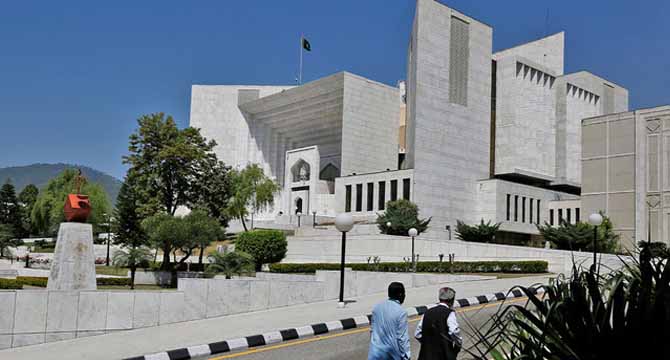ISLAMABAD , July 21, 2023: A larger bench of the Supreme Court on Friday adjourned the hearing on a set of petitions challenging the government’s decision to conduct trial of civilians in military courts.
A six-member bench, headed by Chief Justice of Pakistan Umar Ata Bandial, resumed hearing on Friday. The bench comprises Justice Ijazul Ahsan, Justice Munib Akhtar, Justice Yahya Afridi, Justice Sayyed Mazahar Ali Akbar Naqvi and Justice Ayesha Malik besides the CJP.
Several people have challenged the government’s decision to conduct trial of civilians in military courts after riots and protests erupted across the country and several installations and buildings were attacked and vandalised. The government announced that those found guilty of attacking military infrastructure would be tried in military courts.
The chief justice said the trial of those involved in May 9 violence should not begin in military courts without informing the Supreme Court (SC).
Latif Khosa, the lawyer for petitioner Aitzaz Ahsan, stated that whatever was happening in the country today had taken place during the tenure of former military dictator Ziaul Haq.
“You can’t compare the present era with the era of Ziaul Haq. This is not Ziaul Haq’s era nor is martial law imposed in the country. Even if a martial law-like situation arises, we will intervene,” CJP Bandial said.
CJP Bandial said the court should be informed before military trial of civilians begins. “The trial of the accused in military court’s should not begin without informing the SC,” he said.
Attorney General for Pakistan Mansoor Usman Awan requested the Supreme Court to give a month on the matter of granting the right of appeal to people to be tried in military courts. “This matter needs very careful consideration. It has to be done in such a way that the country’s position at the global level is not affected,” the AGP said.
As the hearing began, AGP Mansoor Usman Awan came to the rostrum and said the apex court had issued him directives in the last hearing. He said he had spoken about the “organised” plan behind the violent events of May 9.
“From the video clips shown in court, it is evident that a lot of people were involved in the events of May 9,” he said. “Despite the large number, after exercising caution, 102 people were pinpointed for court martial,” he said.
At one point, Justice Naqvi asked how it was decided who would be tried in military courts and who wouldn’t. Awan said the offences under Section 2(1)(d) of the Army Act would be tried in military courts.
“Is the Army Act outside the bounds of fundamental human rights?” asked Justice Afridi. The AGP responded in the affirmative, saying fundamental rights were not applicable on the Army Act.

